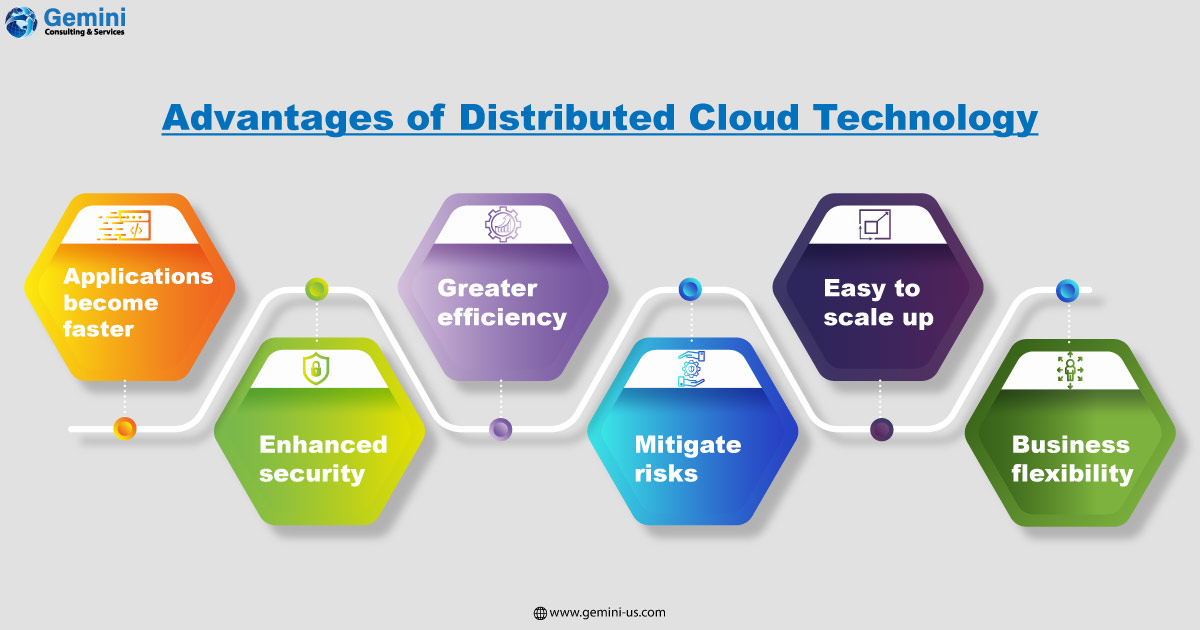The practice of enterprises relying on conventional data centres and individual clouds for their business requirements seems to have come to an end. With dramatic changes in business requirements, cloud computing has become the preferred choice of enterprises to gain a digital edge.
Distributed cloud is a computing service that allows businesses to use public cloud infrastructure in multiple locations. It could be their own cloud provider’s data centres, other cloud provider’s data centers or third-party data centers. With this kind of targeted, centrally managed distribution of public cloud services, businesses can deploy and run applications or components of it in a mix of cloud locations and environments that can enhance their overall performance.
Distributed cloud eliminates operational and management inconsistencies that are likely to occur in hybrid cloud or multi-cloud environments. The computation of workloads is spread across several connected servers and distributed across different geographic locations in a connected manner.
Gartner predicts that most cloud service platforms will provide at least some distributed cloud services by 2024.
Distributed cloud computing helps businesses meet specific application performance and becomes responsive while adhering to regulatory and governance standards. Businesses can also ensure that it meets other criteria, such as the location of cloud infrastructure be made available at serviceable zones of cloud providers.
In a distributed system, different clouds can help serve different purposes. For instance, one cloud may have stringent security safeguards in place to house data that must be protected as per the guidelines of a particular country. Another cloud could be dedicated to supporting SaaS applications used that demand considerable bandwidth needing low latency to operate most effectively.

- Business applications can provide faster and more accurate responses
- Business data can obtain enhanced security
- Greater resource efficiency
- Common system failures can no longer disrupt the entire business operations
- Hassle-free scaling up to accommodate more demands
- Business becomes more flexible and can accommodate ad-hoc requests
Businesses have to adapt, and it is imperative to blend operations with new technologies in IT to improve overall business performance and enhance communication between departments and office premises.
Distributed Cloud and OCI
Businesses need to choose the best cloud for each of their varied key workloads – be it for desktop productivity apps or server-based databases. They should be able to pick and select their public clouds while requiring differing deployment choices. This will help them run some workloads on their own cloud infrastructure.
According to Gartner, in 2022, more than $1.3 trillion in enterprise IT spending is expected to shift to the cloud and this is expected to grow to about $1.8 trillion in 2025. The disruption of the IT market by the cloud will be accentuated by the introduction of new technologies, such as distributed cloud.
Cloud Service Providers (CSPs) have already begun the groundwork on how their services can be delivered, functioned, and consumed by focusing on:
- The extent of control they can afford to give their consumers.
- Their ability to provide distinct proximity to existing workloads/applications.
- Their own acceptance levels of developments in multi-cloud and packaging /selling the same through interconnectivity and ease of use.
Oracle Cloud Infrastructure (OCI) offers many choices to enterprises to customers through its comprehensive suite of solutions. Its distributed cloud strategy helps businesses accentuate their digital journey.
Gemini Consulting & Service can empower businesses with the help of OCI by offering them better control over all aspects of handling data, such as where it resides, its authority, and most importantly security. Contact us to understand how a distributed cloud environment can be beneficial for your business.

OCI Dedicated Region: A complete cloud region in the customer’s data center, it offers all benefits of the OCI’s public cloud while retaining data and service control. OCI Dedicated Region allows businesses to start small and build quickly with an affordable minimum consumption investment paying for only the services consumed. The OCI dedicated region operates as a commercial and government public cloud in over 38 regions and can interconnect seamlessly with other clouds for multi-cloud architectures.
It can also act as a control plane for hybrid cloud offerings while also allowing itself to be deployed in a customer data center as a dedicated, single-tenant cloud repeatedly. The Oracle Cloud deployment options include the hundred plus of the OCI services, or as a subset of the choice of location, security, and compliance clauses.
Oracle Alloy: This infrastructure platform enables service providers, integrators, and independent software vendors to bring cloud services at scale to customer data centres. To facilitate this Oracle Exadata Cloud@Customer extends cloud regions with fully managed hardware and software infrastructure. This service continues to gain popularity for being able to manage cloud infrastructure at customer data centres in over 60 countries as a part of its distributed cloud offering. Compute Cloud@Customer also enables customers to run applications on managed infrastructure in their data centres.
OCI Multicloud: OCI’s multi-cloud services combine the required services to help organizations meet business and technical goals across multiple different clouds. Oracle Cloud and Microsoft Azure Interconnect, the result of Oracle joining hands with Microsoft help enterprise organizations switch to a simple migration path of a multi-cloud environment. The service allows businesses to innovate using the best of Microsoft Azure and Oracle Database capabilities such as Exadata Cloud Service, MySQL, etc.
MySQL HeatWave: A part of the Oracle Database Service for MS Azure, it is available on AWS as well. This is available via the Oracle Interconnect for Microsoft Azure across 12 regions already.



